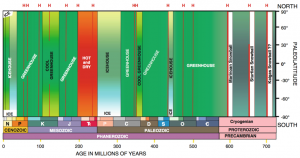Sydney Research Excellence Initiative grant (2017-2018)
Research area, key questions, significance, and innovation. The planet is experiencing a major transition from an icehouse climate, one dominated by permanent continental ice sheets at high latitudes, to a greenhouse climate that favours ice-free conditions. Although part of the deglaciation trend is influenced by a natural orbital cycle, consensus exists that anthropogenic greenhouse gas emissions are greatly accelerating the process [1]. Exploring the geological record is not only valuable in determining the natural climate variability over longer timescales, but is necessary to draw analogues between current climatic transition and similar episodes in the geological past.
Carbon cycle and its interaction with plate tectonics and deep Earth processes play a key role in regulating Earth’s global climate but a mechanistic understanding of the linkages between these elements remains elusive. A quantitative approach to natural climate variability over geological periods is now becoming crucial to better constrain models for carbon fluxes and reservoirs. However, a major component of the carbon system, namely carbonate platforms (i.e., coral reefs and other biogenic carbonates) that sequester large amounts of CO2 out of the atmosphere over geological timeframes,are poorly understood. Fundamental questions emerge, including: (1) How do reefs and carbonate platforms develop in the context of sea level change, lateral and vertical motion of continental shelves, oceanic circulation and changing sediment input, and how does their demise influence the global carbon cycle? (2) How can emerging modelling techniques be applied to understand icehouse to greenhouse climate transitions, and the consequences for carbonate platform development and destruction, including the effects of carbonate recycling into the deep Earth along subduction zones? (3) How can quantitative estimates of the deep and shallow carbon cycle evolution be used to inform multidisciplinary scientific research into climate change, and be applied to policy to manage future impacts and mitigation strategies?
The present climate transition has fundamental consequences for our societal and economic development, with the effects of climate change now guiding key national and international policies. Global sea level rise has strong economic and social implications, with about 60% of the present global population living within 60 km of coastlines. Australia’s Great Barrier Reef, as the largest carbonate platform on the planet, generates $5.7 billion in economic benefit, but its existence is threatened by the combined effects of global climate change and sea level rise. Emerging research is pointing to a barrier reef system on the NW Australian shelf, matching the scale of the Great Barrier Reef, that developed and died as result of major environmental change in the geological past. The objectives of our project are two-fold: 1) to gain insights into the flux of carbon by analysing carbonate platform growth and demise through time, and modelling their evolution using our parallel Badlands software [2] and 2) to advance quantitative approaches to predict the future evolution of reef systems around the world and their impact on the carbon cycle.

![]()
